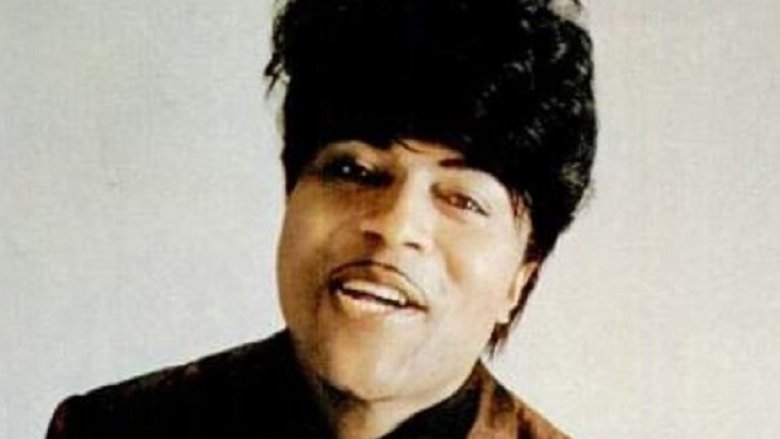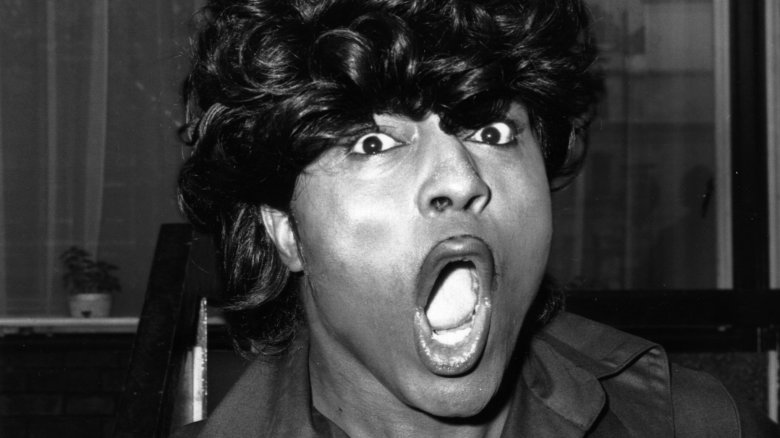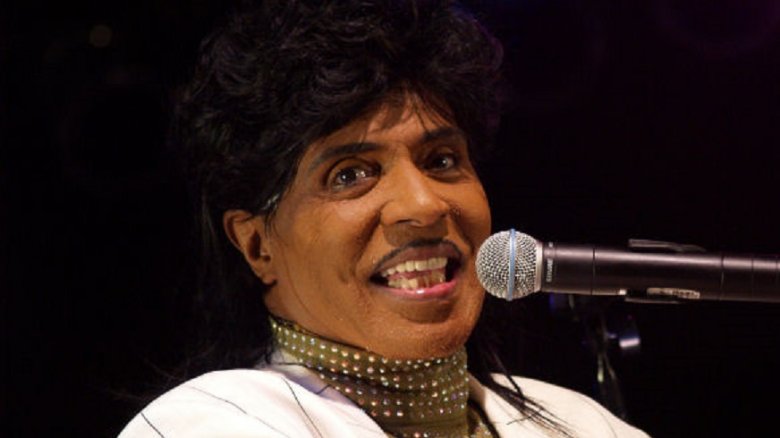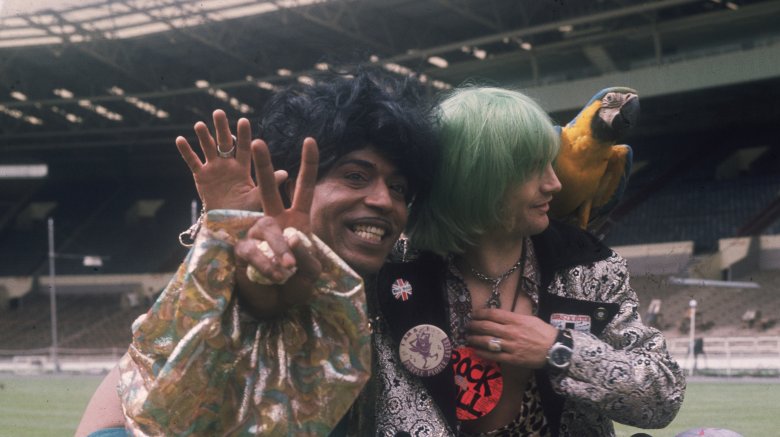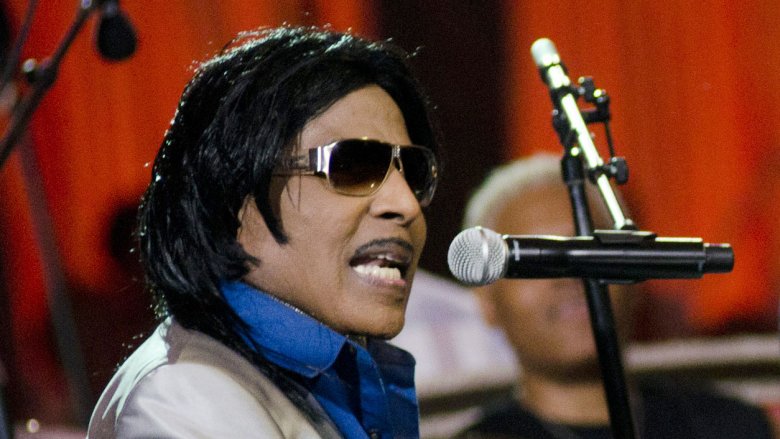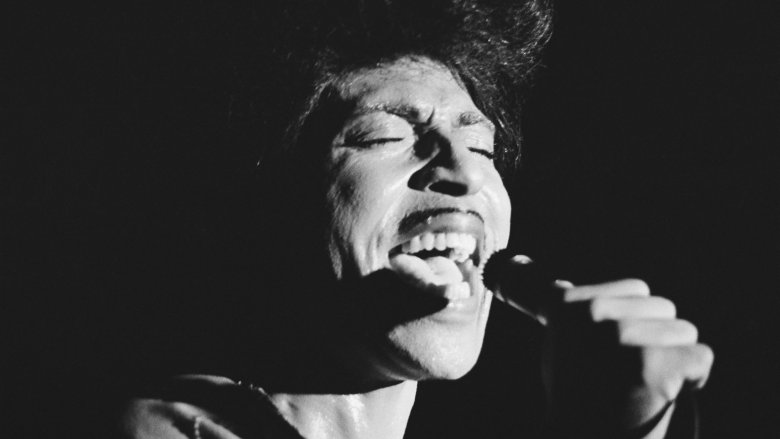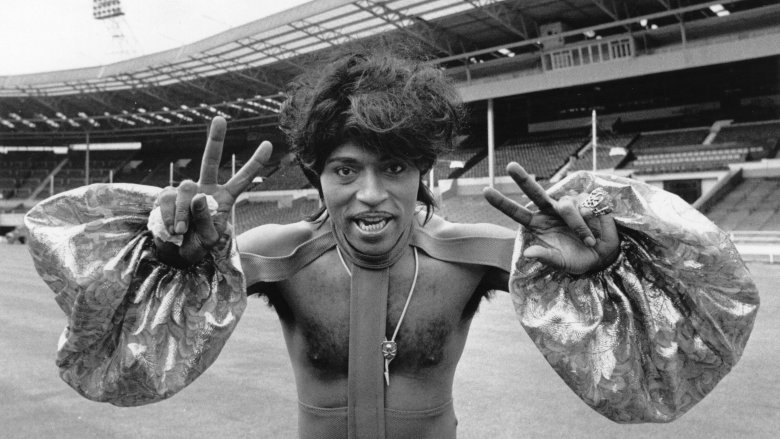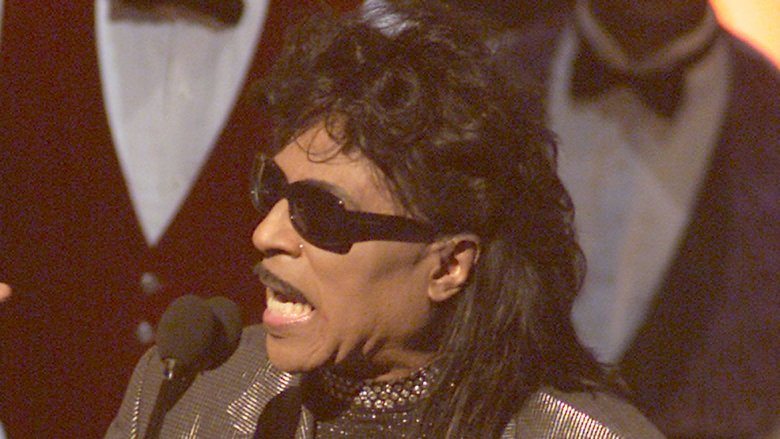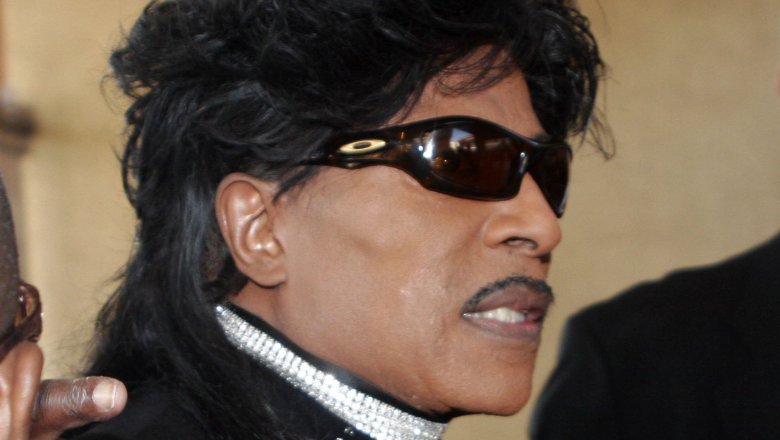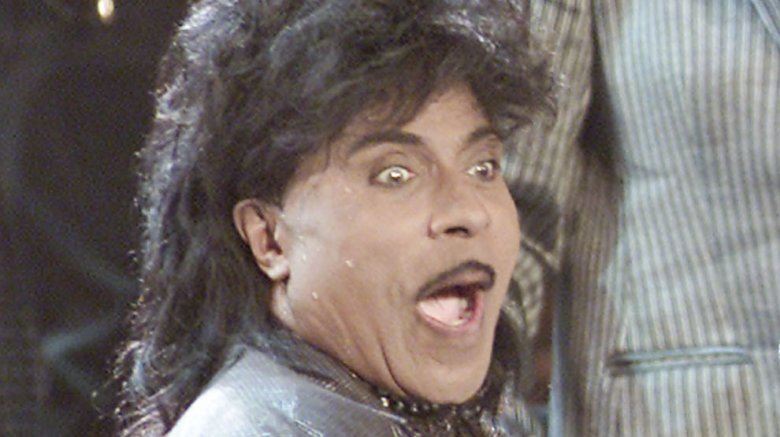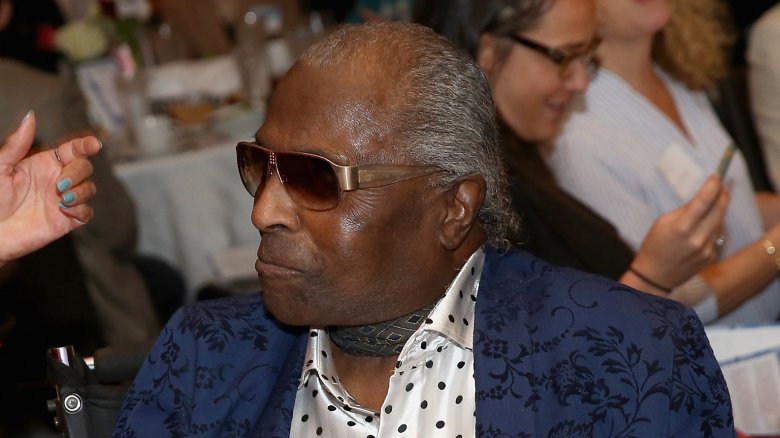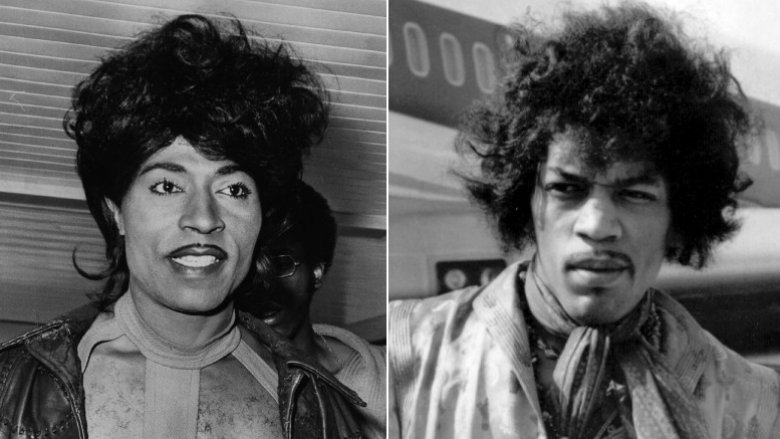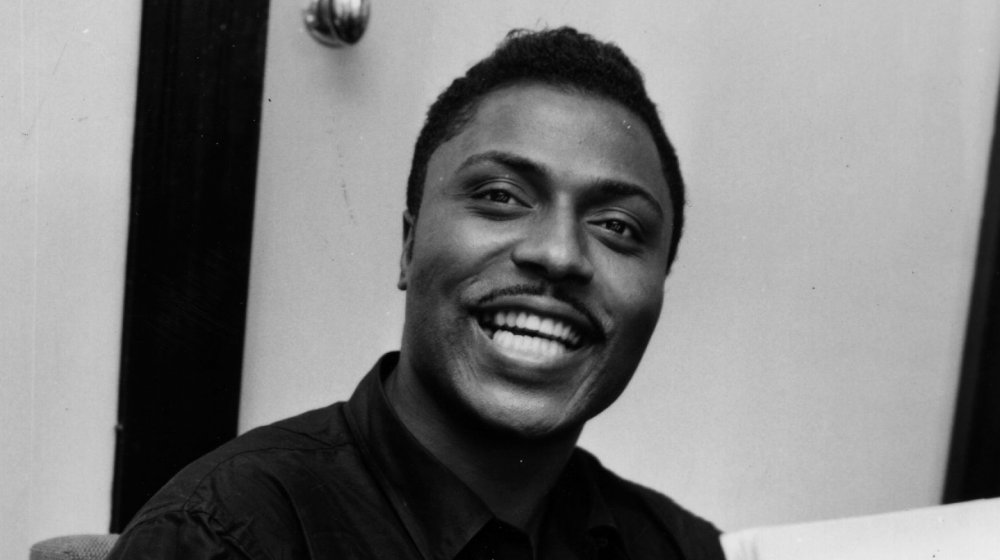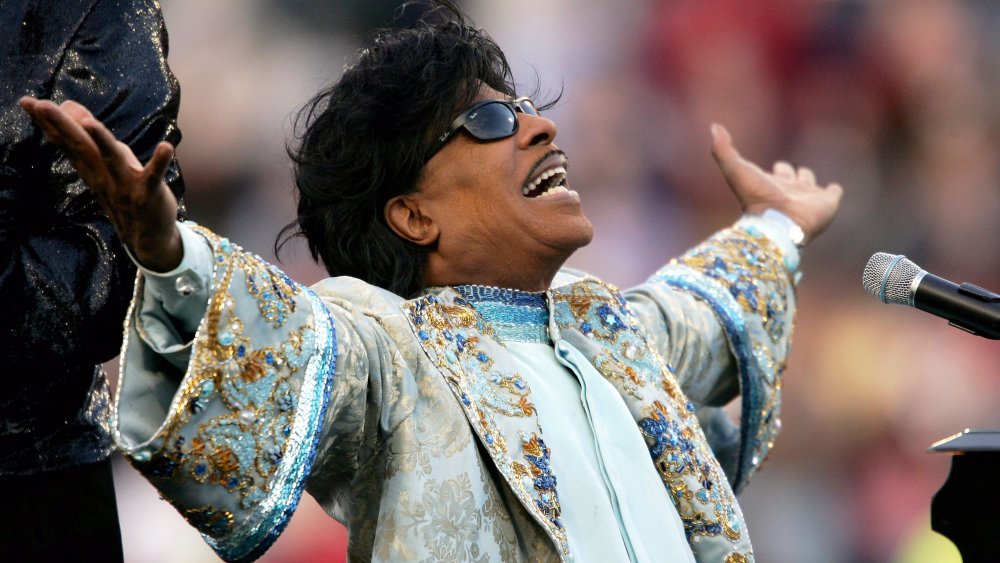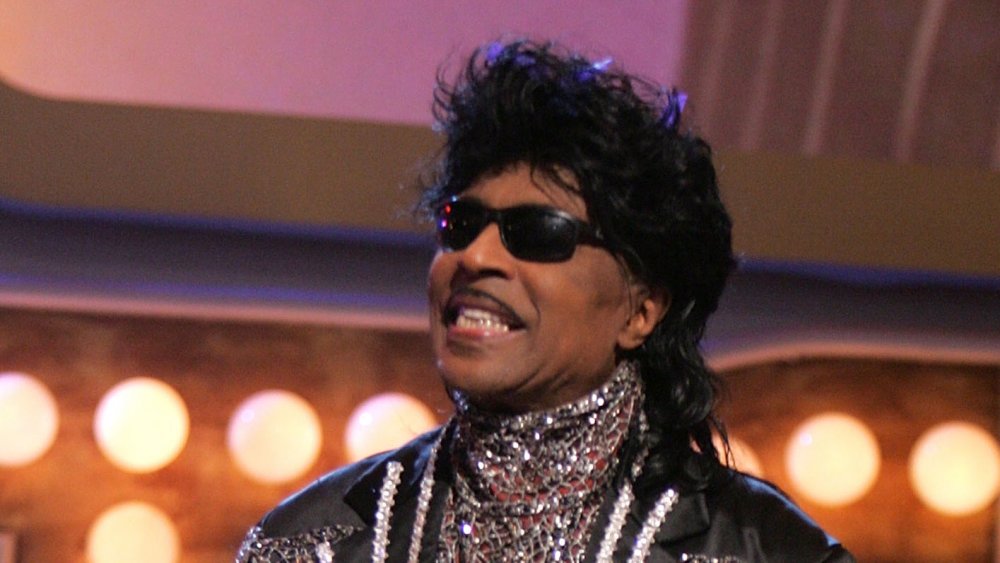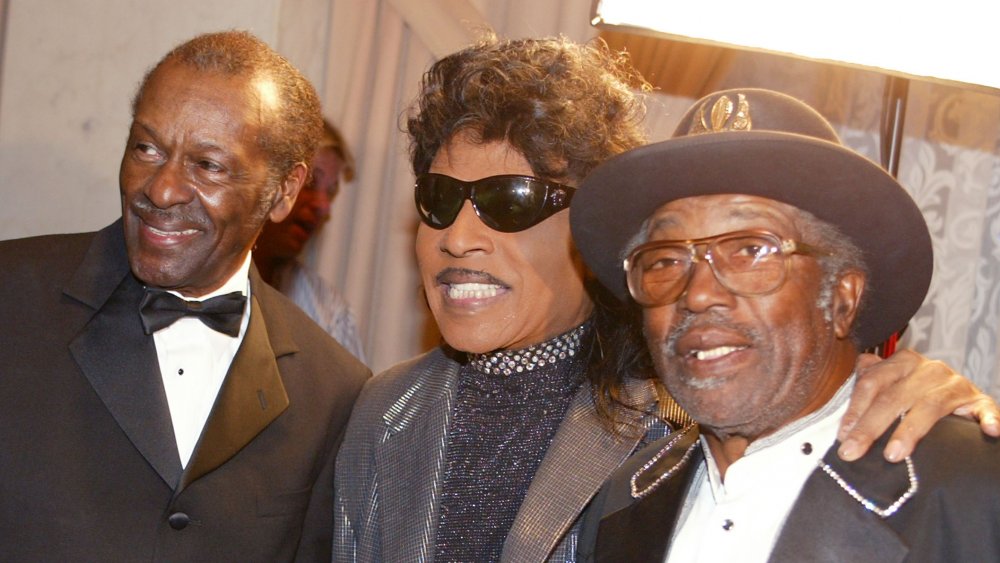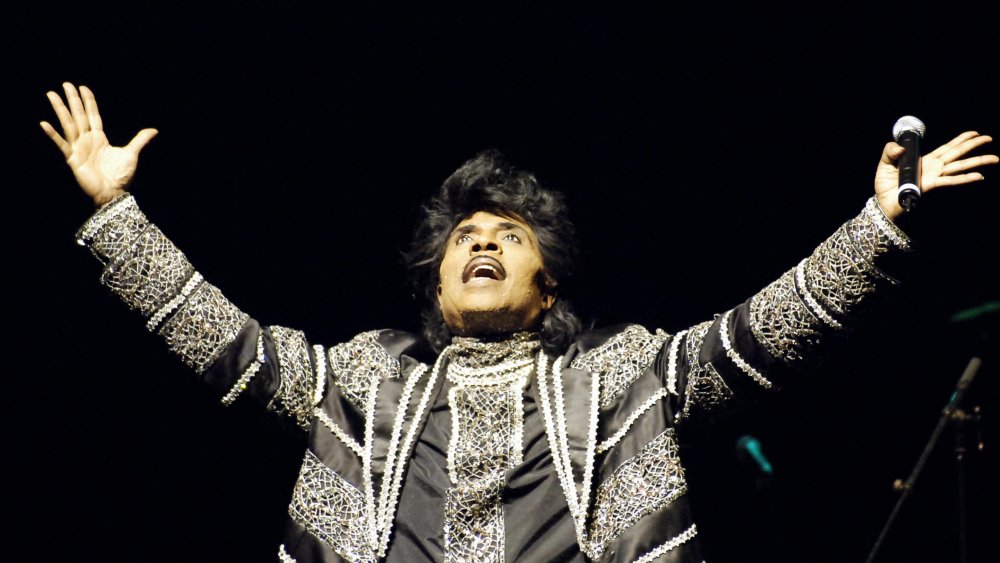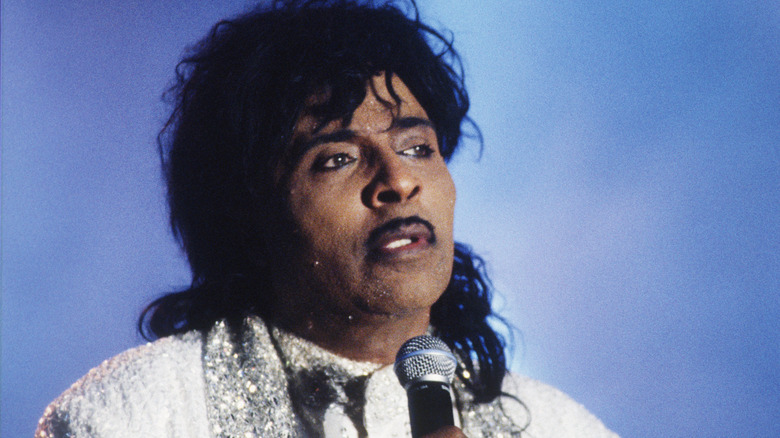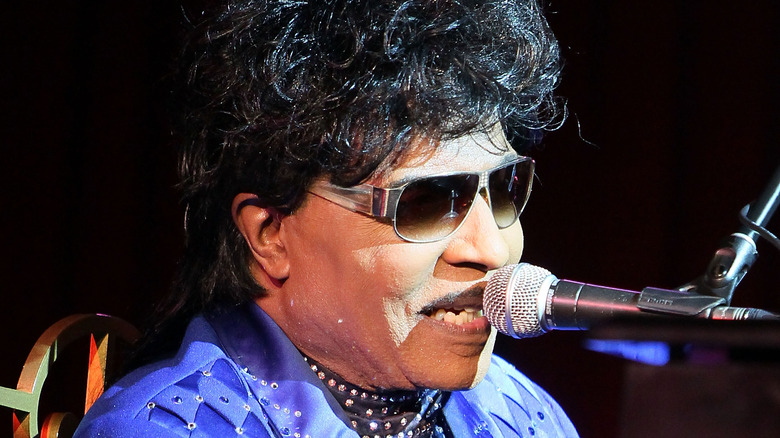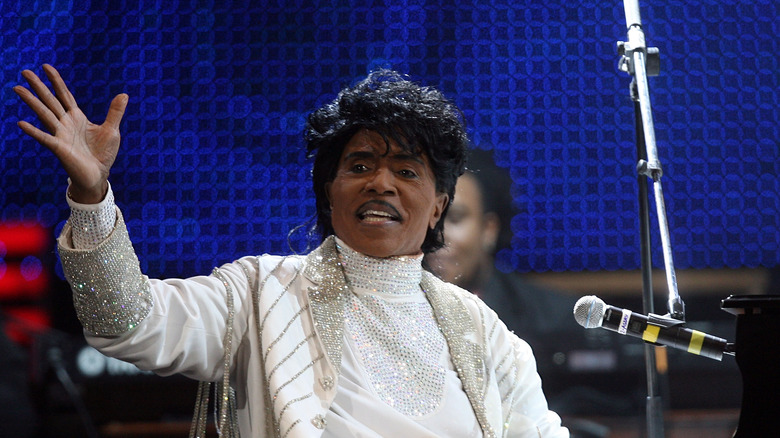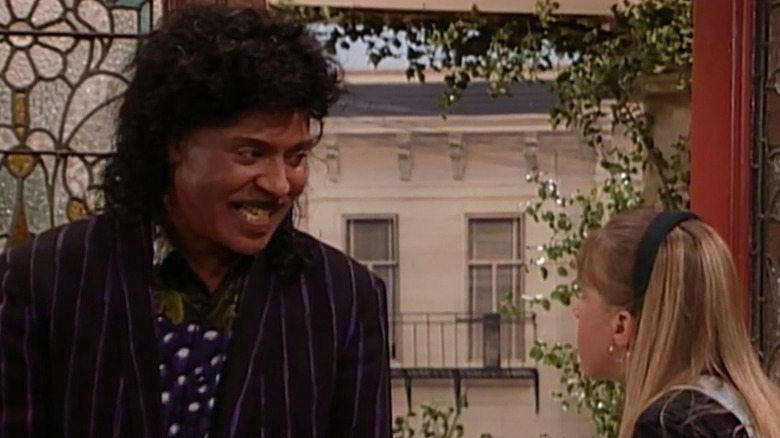The Untold Truth Of Little Richard
If the iconic musician Little Richard didn't invent rock and roll, he most certainly reinvented it. Born Richard Penniman, the golden-voiced gem from Georgia infused his entertaining performances with a flare and femininity previously unseen in the music industry, particularly when it came to male artists. He was a trailblazer and a trendsetter. Others imitated, but he always did it better. And music is better off as a result. It doesn't matter if you're a Hendrix man or a Beatles fan or if you jam to Prince or get rocked by Queen. There's a little bit of Richard in all of them.
The only thing crazier than Little Richard's impact on music is his life story. He's done the insane, embraced the profane, and probably warped his brain. Admittedly, no single article could fully do him justice, but we'll give it a shot. Thankfully, a Little Richard goes a long way.
Little Richard used to give people his poop
Psychoanalyst (and possible psycho) Sigmund Freud believed babies view their poop as presents they can give or withhold. At first blush that sounds like coke-inspired nonsense that Siggy pulled from his unretentive behind. But Little Richard's childhood begs to differ. By Richard's own admission, he used to give his excrement to people.
In Charles White's "The Life and Times of Little Richard," the artist admitted to having "a bowel movement in a box" and handing it to an elderly friend of his as a birthday present. Unaware of the horrors within, she brought the box home so she could open it in front of her friends. Meanwhile, Richard impishly watched from outside. As he recalled, "She wanted to know what I had brought her. She said, 'Let us see what Richard has brought for me.' Then I just heard, "Aaaaaaa, aaaaaaahhh -– I'm gonna kill him. I'll kill him!" Richard laughed and laughed.
That wasn't the end of Richard's excretory shenanigans. He had a bizarre affinity for sharing his derriere droppings, some of which he gave to his mother. Richard rather proudly recounted: "I did some in a jelly jar, and I did it very neatly, and I closed the up the jar and put it up in the cabinet with Mother's preserves." In case you were wondering, she didn't appreciate the gesture. Why Richard did such odiously odorous things is unclear, but his family considered him a "nut." ("Rectal rascal" sounds might be more accurate.)
Little Richard's little leg
Little Richard got away with a lot as a child. According to him, that wasn't based on favoritism but on his physical abnormalities. In "The Life and Times of Little Richard," the musician told biographer Charles White: "I had this great big head and a little body, and I had one big eye and one little eye." But his most defining bodily anomaly was his "little leg."
No, that's not a euphemism — Richard's right leg was 3 inches shorter than his left, which drastically impacted his gait. His steps had an inconsistent cadence, and his hips swayed in a pronounced fashion. As a result, neighborhood children assumed he "was trying to twist and walk feminine." Since some kids are soulless insult machines, young Richard became a consistent recipient of homophobic slurs and other verbal vitriol. On the bright side, the bullying bred a competitive streak in him, driving Richard to outdo everyone in every endeavor he could. And as one of 12 siblings, he always had someone to compete with.
Little Richard's little leg also introduced him to music. As People pointed out, Richard's mother believed that sending him to church would heal his affliction. His leg never lengthened, but his lungs got lots of exercise. At church, Richard learned he had a hell of a voice.
Home is where disheartenment is
Home is supposed to be a haven, a place where sticks and stones won't touch your bones and words won't try to hurt you. Sadly, in Little Richard's case, it was a far crueler version of the bullying he endured outside. As Vice elaborated, Richard was berated and degraded by his father, Charles "Bud" Penniman.
Like the kids outside, Bud Penniman deemed Richard too feminine. The issue wasn't his son's "feminine" walk, but the budding rock star's long hair and propensity to put on makeup. Per The Guardian, Richard also wore his mother's curtains and proclaimed himself "the Magnificent One." These charmingly glamorous antics infuriated Bud, who was a church deacon and a firm believer in gender norms. He not only insulted his son but rabidly attacked him.
Bud viciously beat Richard, who was "naked and tied up" during the unconscionable assaults. When pulverizing his son didn't work, Bud banished him from the house altogether. Richard was just 13 years old. Rejected by his father and harassed by hostile peers, Richard ultimately found acceptance with a white couple named Ann and Johnny Johnson. It was a complete reversal of fortune. According to Rolling Stone, the Johnsons owned the Tick Tock Club, where Little Richard cut his teeth as a performer. After years of being unaccepted, he would soon show the world he was exceptional.
Little Richard's best friend killed his father
In an alternate reality, Bud Penniman might have learned to fully accept his son. According to "The Life and Times of Little Richard," Bud used to bash Richard's decision to be a musician, but he later had a change of heart and listened to his son's songs with pride. By then, Richard was 19 and coming into his own as a performer. He recalled: "My daddy had never been behind me in my career until then, and he was just starting to come behind me. He was going to buy me a car ... to help me in my traveling."
But Bud never got to give his son that car. In a GQ interview, Richard explained, "My best friend Frank shot him. He was out of jail in a week. We never quite found out what really happened." It happened outside a bar. Frank Tanner had been tossing firecrackers into a coal stove at the Tip In Inn, which Bud owned. Perturbed by the juvenile hijinks, Bud eventually kicked Frank out of his establishment. Things escalated rapidly from there. Frank made a huge fuss outside, so Bud grabbed a gun and went to confront him.
It's not clear exactly what happened, but Bud died. In one fell swoop, Little Richard lost the man who had helped give him life but also made that life a nightmare. But the scars his father left remained. Bud had rejected Richard; Richard would also reject himself years later.
Little Richard's Tutti Frutti bears fruit
In 1955 Little Richard released his first and most famous hit, "Tutti Frutti." The tune's upbeat sound, gibberish lyrics, and energetic wooing made it perfect for people who like feeling happily confused. However, the song wasn't always the "rutti"-centric sound salad that everyone knows and loves. In fact, there was no "rutti" in the original version, and it probably wasn't Daisy who almost drove Richard crazy.
In what is certainly disappointing news to many pre-teens, "Tutti Frutti" wasn't an ode to farts. But the tune was very butt-heavy. As the Library of Congress elaborated, the line "Tutti frutti, aw rutti" used to be "Tutti frutti, good booty." Rolling Stone further observed that the "lip-smacking celebration of 'good booty'" contained insertion-related innuendos like "If it don't fit, don't force it/You can grease it, make it easy." However, it's not entirely clear whose backside is getting all that easy grease. The Library of Congress claimed the song was about lovely lady rumps. But Billboard claimed Richard was gushing about a gay dude's glutes.
Unsurprisingly, those descriptions were sanitized for marketability. But what about the tune's famous "A-wob-bom-a-loo-mop-a-lomp-bom-bom"? According to Rolling Stone, Little Richard has provided two different backstories. The utterance is either onomatopoeia for a drum beat or something Richard angrily exclaimed during his days as a dishwasher. Whatever the case, it sounds awesome and put the perfect cherry atop a tasty verbal euphemism sundae.
Little Richard rails against the music industry
Music fans weren't the only people who loved "Tutti Frutti." It was also a boon for Pat Boone, who quickly recorded his own rendition, per the Library of Congress. This would become a recurring theme in Little Richard's career, as other artists would duplicate his music. In the case of "Tutti Frutti," Boone initially achieved greater success with his version of the song, despite it sounding like crap.
Boone had a habit of ripping off Richard, who believed Boone benefited from racial prejudice. In 1984 he explained to the Washington Post: "When "Tutti Frutti" came out, Elvis was immediately put on me, dancing and singing my songs on television. In "The Life and Times of Little Richard," Richard recalled that "a lot of people in management didn't like it 'cos I was a white attraction." According to him, that resentment translated into blatant disrespect. When performing in Las Vegas, for example, he received worse accommodations than white musicians and got financially shafted.
He didn't simmer in silence, however. He demanded fairer treatment, but in the end, he believed that racism robbed him of his musical legacy. During a 1999 interview with the Washington Post, Richard touted himself as "the architect of rock and roll," before lamenting that "If it's a white guy, they say he's the King of Rock 'n' Roll, but if it's a black guy, they add 'self-proclaimed'; they say he's the 'self-proclaimed King of Rock 'n' Roll.'"
Little Richard's wild side
Little Richard soared to incredible heights during his career. He also got incredibly high. A lot. As the artist detailed during a Jet interview, he did drugs religiously. He puffed pot and had a soft spot for PCP. Cocaine was his hands-down favorite, though. Richard called himself "one of the biggest cocaine addicts," adding, "They could have called me the little white boy with the shiny nose." They could have also called him Rudolph because his nose was so red. He once told People that "blood and flesh would come out" whenever he blew his nose, and at that point, he was doing $1,000 of coke a day.
Richard was also addicted to self-diddling and would hand-pump his Little Little Richard up to eight times a day. But he didn't just play with himself; he played with everyone. Richard was into guys, girls, and groups. He was a hardcore voyeur and often asked girlfriends to get with other men while he watched. One of those mates was allegedly a girl named Audrey Robinson.
As GQ recounted, Richard first spotted Robinson when she was just 16 years old. He couldn't keep his eyes off her. (Or at least parts of her; she was apparently very busty, which yes, is a very uncomfortable thing to say about a child.) The two developed an incredibly close bond, and according to Richard, Angel (a name she later took) fulfilled his freaky fantasies: "She would do anything to excite me, including having sex with other guys while I watched." Angel, however, disputed some parts of this. Maybe it was all in Richard's drug-addled head.
Little Richard's relationship with religion
Little Richard's ravenous coke consumption and unfettered fornicating were firmly at odds with his conservative upbringing. He grew up in a Seventh-day Adventist household in the deeply religious Deep South during the 1930s. According to Rolling Stone, both of his uncles and one of his grandfathers were preachers. His deacon father reviled him for showing homosexual tendencies. The tremendous tension between the piety that was pressed upon Richard and his libertine lifestyle weighed heavily on him. His two incompatible selves often competed, and he swung back and forth wildly between religion and the world.
As Billboard detailed, during the mid-to-late 1950s, Little Richard rolled out hits and raked in the dough. But with fame came homosexual encounters, which he deemed "unnatural." So he renounced rock and roll and attended college to study theology. He couldn't suppress his attraction to men, however, and "was caught asking a deacon's son to expose himself." An attempt to launch a gospel career also failed. Richard went back to backsliding.
In 1975, a family tragedy prompted him to become a preacher, per People. He had promised to lend money to one of his brothers but delayed the favor in lieu of a "cocaine-and-sex party." Then that brother died. Racked with guilt, he again disavowed homosexuality and rock music. In 1995, he tried to reconcile his faith and sexual identity, telling Penthouse, "I've been gay all my life and I know God is a God of love, not of hate." But 2017 saw another significant shift as Richard repented once more.
Little Richard's near-death experience
During the latter half of the 1970s and the first half of the '80s, Little Richard replaced his microphone with a pulpit. Gone was the makeup that helped make him famous. He had kissed his kinky orgies goodbye. He had come to Jesus. But in 1985 Jesus nearly came for him.
Per the LA Times, Richard had a pretty nasty collision with a telephone pole while driving late at night. His sports car crumpled, his little leg got broken, and his ribs took a fairly fierce beating. Firefighters on the scene had to pry him free with the Jaws of Life. An orthopedic surgeon told the LA Times that Richard was "lucky to survive the accident." Little Richard, however, had a different interpretation: that God had saved him.
Perhaps abandoning his raunchy ways had saved the day. Richard vowed to keep spreading the good word and fighting the good fight. Not long after, he returned to rock and roll.
Little Richard's rock and roll soul
No matter how far or fast you run, you will never escape yourself. Little Richard grappled with that reality seemingly a million times during his start-and-stop career. According to the Washington Post, Richard's rock and roll itch returned in 1986. That year he was inducted into the Rock and Roll Hall of fame and people started buying up his biography.
But according to Richard, his decision had a much deeper motive. It wasn't about clinging to fading vestiges of fame or having one last cash grab. It was a fundamental statement about who he was. As Little Richard put it, "Rock and roll is something I created. It's all I know how to do; I don't know how to do anything else. I'm not a minister, and I'm not what you call a gospel singer, even though I've made some gospel records. I'm just an old country rock and roll singer from Macon, Georgia."
According to Rolling Stone, that old rock and roll singer also pulled a few new tricks out of his bag during the 1990s with several film appearances and some surprisingly catchy covers of children's songs. In fact, even in old age as Richard disavows his old self, he still wears fabulous suits and sparkly shoes. Some habits die hard, and rock and roll never dies.
Jimi Hendrix had an awful time working for Little Richard
Little Richard and Jimi Hendrix have both earned spots on the Mount Rushmore of rock musicians. And in 1965 Hendrix earned a spot as a guitarist in Little Richard's band. That sounds like a recipe for greatness, but Hendrix described an awful experience: "Bad pay, lousy living, and getting burned."
Richard might have called himself little, but he had a Rushmore-sized ego. As recounted in "Becoming Jimi Hendrix," Richard issued $50 fines for not calling him "King." He refused to let anyone, even the supremely talented Jimi Hendrix, outshine him onstage. That rule applied to attire, hair, and even facial expressions. When Hendrix and another band member wore "frilly shirts," Richard told them, "I am the only one allowed to be pretty." He once fined a musician for smiling mid-performance. He also fined Hendrix for refusing to cut his hair and at one point fired him for wearing a nice shirt. (He rehired Hendrix a day later when Hendrix sold the shirt.)
When he wasn't hassling Hendrix over his wardrobe, Richard was allegedly trying to get the guitarist's clothes off altogether. Rosa Lee Brooks, who was romantically involved with Hendrix, recalled, "When I first met Jimi, he was under so much stress from being chased by Little Richard." When Hendrix made it clear that his jimmy was off limits, Richard asked to watch Hendrix and Brooks make love. That, too, was refused.
Little Richard's short-lived marriage
Little Richard didn't believe in half-measures. As he told Jet in 1984, "I have to give 100% to whatever I do." He certainly went all the way with the naked escapades and booger-sugar shenanigans of his rock star lifestyle. But at other points, he tried to tame his inner party animal and go "all the way with God" as a minister. "I can't do both," he said. But he also couldn't fully do either.
In 1959, Richard tried so hard to divorce himself from his homosexuality that he actually married a secretary named Ernestine Campbell. Per the Washington Post, the pair met at a revival in the late 1950s during one of Richard's attempts to forsake men and rock music. Yet for as hard as he tried, men made him harder. Via GQ, throughout his marriage, he voraciously pleasured the littler Richard in his pants. He believed his wife was blind to his homosexuality because she just thought he was a masturbation enthusiast, or "pumper." "I was pumping so much peter in those days; eight or nine times a day," Richard recalled.
A person can only pump themselves up but so much before they explode. And Little Richard exploded his marriage after he was arrested in a raid of a men's restroom. They divorced in 1961. He and Campbell never had children, but Richard adopted Danny Jones, the son of a church associate who died.
Little Richard's fairy godmother of rock and roll
Little Richard might be the Architect of Rock and Roll, but even he needed building materials. And for him, those largely came in the form of Sister Rosetta Tharpe. According to the Cleveland Plain Dealer, Richard described her as his favorite childhood singer. Per the Atlanta Journal-Constitution, Tharpe sang gospel with an energetic edge, shouting and playing her electric guitar. She would come to be regarded as the "godmother of rock and roll," and she became a fairy godmother of sorts to a 14-year-old Richard.
Before performing at an auditorium in Little Richard's hometown of Macon, Georgia in 1947, Tharpe overheard him singing her gospel songs. She immediately became a believer and invited him to sing on stage. Then paid him. This convinced Richard to pursue music as a career, according to the Atlanta Journal-Constitution. He apparently concluded that he was too cool for school because he dropped out after the 9th grade, via ABC, and began performing R&B on the road. Per Rolling Stone, he inked his first record deal in 1951 with RCA after giving people the time of their lives at the Tick Tock Club and winning a talent show.
The biggest regret of Little Richard's career
If you die without experiencing a single regret, there's a chance you haven't lived enough to learn from your mistakes. Little Richard did a lot of living and a lot of learning the hard way. The hardest lesson of his career was that he wasn't knowledgeable enough to stop cutthroat music companies from seizing his money by the jugular. Speaking with Jet in 1984, Richard admitted, "I was ignorant, illiterate really. I was so glad to be famous, but if I had my life to live over again, one of my greatest desires would be to be more educated so I could protect myself." Instead of living his life over again, Richard battled Specialty Records over and over.
As recounted by Royalty Exchange, Little Richard first signed with Specialty Records in 1955, and per the terms of their contract, he would own all the music rights and receive 50 percent of the royalties. However, he would soon learn that the company's specialty was not paying him. Unfortunately, he sold the publishing rights for $50, so instead of earning a fortune, he got half a cent per record sale. Richard sued in 1959 and settled for $11,000 in exchange for waiving his claim to royalties for multiple classics, including "Tutti Frutti" and "Long Tall Sally."
In 1984, Richard sued Specialty Records again along with other parties for $112 million and control of his music. They reached an out-of-court settlement in 1986.
Little Richard's hip replacement
In his prime, Little Richard was more than a showstopper — his showmanship was nonstop. "He pulled all the stops," said saxophonist H.B. Barnum. Richard would "be on the stage, he'd be off the stage, he'd be jumping, yelling, screaming, whipping the audience on, whipping on them." Footage of Richard in his younger days shows him playing the piano with his back turned to it, playing with a leg propped atop the piano, and singing his ever-loving heart out.
Watching Little Richard perform you realize that the saying, "the show must go on" took on a very different meaning with him because you never wanted the show to end. But even if the showman keeps going, one day he slows down. In his later years, Richard found himself increasingly hampered by sciatica, according to Ultimate Classic Rock. Characterized by radiating pain along the sciatic nerve, per the Mayo Clinic, sciatica impacts the lower back, butt, and hips. Once the gif that kept on swiveling, Richard's hip was giving out on him and needed to be replaced. He underwent an overdue operation in 2009. But it might have hurt more than it helped. As detailed by the Oxford American, the aftermath was disastrous for Richard, who was quoted as saying, "The hip surgery was really bad for me. I haven't walked since. I'm in pain 24 hours a day."
Good golly and goodbye
Rock and roll never dies, but sadly, rock and roll legends do. On May 9, 2020, Little Richard's rock and roll soul left his body. He was 87. According to the Guardian, Richard spent the latter part of his life in declining health. He had suffered a heart attack, a stroke, and hip issues. His agent, Dick Alen, said Richard succumbed to bone cancer. "He was battling for a good while, many years," Alen revealed. "I last spoke to him about two or three weeks ago."
News of his passing rocked the music world, and some of the biggest names in the business paid tribute to this larger-than-life icon. Mick Jagger called Little Richard the "the biggest inspiration of my early teens," per Rolling Stone. Jimmy Page lauded him as a rock and roll pioneer. And Ringo Starr called him "one of my all-time musical heroes." There aren't enough adjectives or thank yous you could say to a person who inspired so many careers and wrote the soundtrack to so many happy memories. Fortunately, Little Richard already knew how great he was.
Little Richard came from a huge family
"Little Richard" wasn't born with that moniker. He came into the world in 1932 in Macon, Georgia, as Richard Wayne Penniman, the youngest of 12 various and assorted brothers and sisters, according to the BBC. (His mother had intended to name him Ricardo, but a paperwork mistake made him Richard, and the name stuck.)
Bullied as a child for a limp, young little Richard suffered hideous physical abuse from his father, who once whipped him when he was caught singing for his sisters while wearing makeup and a dress. That father forced Little Richard to leave home. "My daddy wanted seven boys, and I had spoiled it, because I was gay," he told "The South Bank Show" (via The Independent) in 1985.
Little Richard would eventually move west, and bring all of his siblings along. "I raised them, they were little bitty kids when I brought them to California," he told Rolling Stone in 1970. Of the collective seven boys and five girls, Richard was the only entertainer or public figure. "I have two sisters that are registered nurses, and one of my brothers is a C.P.A., all of them have good positions now." Brother Peyton, who played in Little Richard's band, did a stint in the military.
If you or someone you know may be the victim of child abuse, please contact the Childhelp National Child Abuse Hotline at 1-800-4-A-Child (1-800-422-4453) or contact their live chat services.
Little Richard lived in hotels
Unlike other world-famous, highly influential, and successful rock and pop stars, Little Richard didn't live out his final days in some palatial mansion in an exclusive gated community overlooking a major city. According to Rolling Stone, Little Richard's last years were spent largely at the Hilton Downtown Nashville, close to "Music City" landmarks like the Country Music Hall of Fame and numerous historic honky-tonks. Even when mobility issues required the singer to use a wheelchair and rely on the assistance of his son, Danny, he'd come down the elevator every morning at 11 a.m., in full stage makeup, wig, and spangly costume. Sometimes, he'd play some music on the lobby piano on the way to his waiting gold Cadillac Escalade. Little Richard had taken residence at the Hilton shortly after moving out of Los Angeles in 2003 to be near his sister, and he worked out an arrangement with management to pay by the month.
That wasn't Little Richard's first prolonged hotel stay in a musical neighborhood. At the outset of the 1980s, during a spell in which he'd quit music and worked as a traveling representative for a bible publisher, he took up at the Hyatt Hotel on Los Angeles' Sunset Strip, the birthplace of numerous hair metal bands, according to Curbed.
He unofficially adopted his son, Danny
Little Richard died at age 87 in 2020, and one of his primary caretakers at the time was Danny Jones, his son. Jones wasn't Little Richard's biological offspring — the singer adopted him in 1984 when he was 14, according to Rolling Stone, but it was never a binding, legal, or official arrangement.
Back in the early 1980s, when Little Richard had quit music (and drugs) to devote his energies to the Seventh-day Adventist branch of Christianity, he made friends with a woman at his church named Creola Jones. Her husband died in 1982, and Richard sang at the funeral. He befriended the family and doled out advice and guidance to Danny Jones. "He would just always encourage me," Jones said. "I had six sisters and three brothers, living in a poor neighborhood, doing whatever." His mother asked Little Richard to informally but fully take custody of Danny, at the time a young teen. "She didn't want me turning out like the rest of my sisters and brothers."
Little Richard accepted, and no papers were ever signed, merely a handshake to seal the deal, and Danny Jones moved in with Richard in his suite at the Hyatt on Los Angeles' Sunset Strip. They lived with one another for more than 30 years.
Everywhere you looked, there was Little Richard
In the mid-1980s, Little Richard returned to the cultural spotlight, following a self-inflicted hiatus to pursue religious work and spiritual concerns. He'd launch a comeback that would last for more than a decade, establishing Little Richard as a beloved, entertaining statesman of American pop culture, rock n' roll, and nostalgia. In 1984, his biography "The Life and Times of Little Richard: The Quasar of Rock n' Roll" hit stores, followed by "Lifetime Friend," his first pop recording in more than a decade. The leadoff song "Great Gosh A'Mighty" appeared in "Down and Out in Beverly Hills" (as did Little Richard himself) and made a good showing on the Billboard pop chart.
Little Richard was among the first class of inductees into the Rock and Roll Hall of Fame, and was all over TV. He showed up on "Miami Vice," "Baywatch," "Martin," and in 1994, a very special episode of "Full House" built around his presence, per Rolling Stone. When the arts program at little Michelle Tanner's school is threatened, de facto dad Joey steps in and runs for the Parent-Teacher Association presidency. His get-out-the-vote rally features a performance from the uncle of Michelle's friend Denise — Little Richard. After playing "Itsy Bitsy Spider" on big fan Uncle Jesse's keyboard, he knocks out a live rendition of "Keep A-Knockin'" with Jesse's band, the Rippers.
